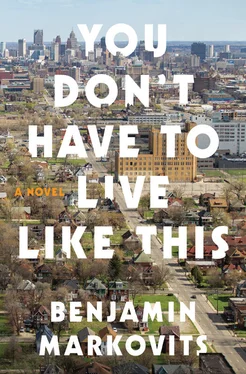Already a few people had started to move in. A guy called Eddie Blyleven who used to work in insurance, an ex-jock, blond-haired, recently divorced, whose daughter came at weekends. There were a couple of single dads, in fact, with weekend kids. Steve Zipp had a six-month-old baby, his first. He looked about forty-five, a nervous, badly dressed, pale, black-haired midwesterner. His shirt collars were too big around his neck, he wore cheap suits, but I’ll get to his story later.
There was a house at the end of the block where a family of holdouts lived, a mother and son, and Hector knocked on their door and the son came out.
“Yes?” he said. He had kind of a faggy accent, but he was a big black guy, built like a linebacker, with muddy-looking skin and lots of little pigtails of kinky hair hanging down to his shoulders. Maybe he was thirty-five years old — some of the muscles were turning to fat.
“This is just a courtesy call,” Hector told him. “We got to shut off the electricity for a couple of hours. I wanted to let you know.”
“The fuck you do.” A dog came out between his knees, a brown-faced pit bull, and the man took hold of his collar.
“Look,” Hector said. “I should have introduced myself first. Hector Cantu — I live about thirty blocks up Van Dyke from here. My guys are just helping out a friend. This is Marny.”
“Nolan Smith,” he said but didn’t shake our hands.
At this point the mailman came up the steps behind us. A big old guy with the kind of black skin that changes color around the eyes, like a sink around the drain. He handed Nolan a few bills and patted the dog.
“Mrs. Smith doing all right?” he said.
“Not too bad.”
“We got off on the wrong foot,” Hector said, when the mailman had gone.
“If you want to talk to a more mannerly person, you can talk to my mother.” There was a cardboard box on the front porch, with the label peeling, and Nolan reached inside it to pick up a handful of dry food, which he dropped in a bowl by the door. The dog went over to eat. “But she’s asleep.”
“We don’t want to wake her. We just wanted to let you know.”
“If you wake her, I’ll set my dog on you. Get you some water, Buster.”
He clattered through the screen door with the water bowl. Hector and I waited on the porch while the dog ate, moving his jaws like dogs do, partly chewing and partly just catching the pieces of food in his teeth.
“Buster,” I said to Hector.
Then Nolan came out again with fresh water and set the bowl down. “This is what’s going to happen,” he said. “If you need to shut down the street, you may do so at my convenience. Now is not a convenient time for me.”
Hector said, “I got a permit here. I don’t need to ask you. I’m just letting you know.”
“If you shut it down,” Nolan told him, “I will personally come by your house with a baseball bat and break windows.”
We stared at each other for a minute on the front porch. It was a fresh sunny afternoon. There wasn’t much traffic around but up and down the street you could hear the sound of people working with their hands; in its own way, quite pleasant. A spring sound. Nolan said, “You think I’m angry. I am not angry. This is how I talk.”
“Look,” I said. “I’m the one who’s going to be your neighbor. Hector here’s just helping out. I don’t want any hard feelings.”
“You are not understanding what I am saying. I don’t have any feelings about you at all. Maybe you think I have some kind of Mexican thing against your friend. I don’t. Maybe you think it bothered me that your representatives came by three four five six times to try to persuade me to persuade my mother to sell her house so that more white people could move in to the neighborhood. It didn’t. If you want to move in here, that’s your business. But if you interfere with my life I will interfere with yours.”
“All right, okay. When would it be convenient for us to turn off the electricity?”
“I’ll let you know,” he said.
In the end, we waited all afternoon for the go-ahead. Angelo said he had other things to do, but in the morning, without asking me or telling anyone else, he shut down the street and reconnected the supply line running from my house to the mains. A few of his buddies stood in the yard with hammers, wrenches, shovels and tire irons, but nothing happened, and an hour later Angelo switched the lights back on.
That weekend Beatrice had arranged a launch party at Bill Russo’s house on the shores of Lake St. Clair. A publicity stunt. There was a big barbecue on Saturday, with a band and a marquee, as the English call it. Basically a large tent. The idea was, so people moving in could meet a few representative members of “old” Detroit — community leader types, priests, schoolteachers, artists, businessmen. WDIV, the local NBC affiliate, had promised to send a van. The house was grand enough for some of Robert’s “closer” friends to stay over, which included me, and Sunday afternoon was supposed to be a chance for us to hang out quietly before things got crazy. Robert’s wife planned to fly in, with their son. Clay Greene was also bringing his family.
It’s about an hour in the car from Detroit, and I drove up with Bill Russo and Johnny Mkieze and Beatrice, in Bill’s old Cadillac, his father’s car, a 1963 DeVille. Johnny and Beatrice squeezed in the back. I was kind of jealous of them, sitting on top of each other like that, with their legs pushed to the sides and their knees knocking. Johnny was a small guy, but physically strong and very dark-skinned — attractive to women. His accent was almost perfectly American, but he had a way of talking to women that no straight American man could pull off, like he was one of them, but in a flirty way, too. He made them laugh.
I said to Beatrice, “You gotta have a woman up front,” but she insisted: “You get carsick in the back.” Which is true, I’ve got no stomach for tight spaces. So I said to Bill, “I guess you’re stuck with me.”
After five minutes, with the window down, I forgot about the two kids behind me, who couldn’t hear us anyway with the noise from the road, and talked to Bill. Everyone seemed in a good mood. It was the first really warm day of the year, what I would call southern warm, where you don’t have to worry about a little wind or shade. The air felt like an old towel fresh out of the dryer. I didn’t know Bill very well though I’d known him for almost fifteen years. We had one of those funny relationships, intimate-flavored, kidding, natural, but also formal, polite and distantly friendly at the same time. There were basic facts about his life I was ignorant of, and vice versa. Like the fact that his sister was married to one of the producers of One Tree Hill , and lived in Hollywood, in Beverly Hills, in a house with a small Picasso in it.
“A small Picasso,” Bill said again.
I was suddenly very happy to be there, with this young state rep, in a classy old car, driving out to some beachfront mansion, which he’d been going to since he wore diapers. It was great to hear him bitch about that Picasso.
In college I thought he was a spoilt little rich kid — one of those kids who compensates by digging latrines in Ecuador over summer vacation. But his friends were still private school friends and he wore his varsity wrestling jacket all over campus. Somehow, he hadn’t changed but I didn’t mind. It was also true that he spent his days doing good in the world, and rubbing shoulders with the kind of people I don’t even like to shake hands with when they ask me for change outside the lobbies of heated buildings. He visited the Boys & Girls Clubs, talked to drug counselors (mostly reformed addicts), pushed their case in the House, sometimes gave out of his own pocket. Prison reform was his hobbyhorse. “People think I’m a crazy fucking liberal, but I’m basically a practical guy. Most of those bums deserve to rot in jail but it doesn’t work. It just doesn’t work.”
Читать дальше












